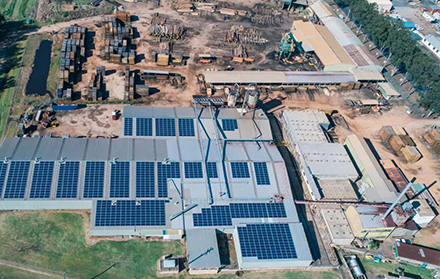After three years of fires and floods, sawmills in northern New South Wales are struggling to find reliable supplies of timber. Source: The Australian
Roads damaged by heavy rain in early-2022 have complicated access to state forests for timber cutters, who were already challenged by fires that incinerated parts of the region in late-2019 and early-2020.
For much of 2022, Donna Layton, the general manager at the J Notaras and Sons sawmill in Grafton, 80km northwest of Coffs Harbour, has watched anxiously as the timber pile has dwindled to as low as one or two days’ supply.
“When it’s like that, you’re counting the logs and the fellas get very nervous,” Ms Layton said.
“We haven’t recovered since the bushfires. We’re 30% down on what we were getting. The two weeks’ supply we’ve got now is the best I’ve had in six months.”
The family-owned mill in Grafton, which produces structural timbers, timber flooring and hardwood, has managed to retain its workforce throughout the supply shortage, but the staff have had to cut back on hours and switch to maintenance jobs while the timber is rationed out.
“We worked a four-day week for 12 months after the bushfires,” Ms Layton said.
“But when the floods came through, they couldn’t go back to four-day work weeks. It was too tough on the staff, so we’ve been doing things differently. We will have maintenance days, where everyone is focused on that.”
The South Grafton mill, which processes up to 70 cubic metres of logs a day, was acquired in 1966 by brothers Lambrinos and Spiro Notaras, who started their milling business in 1952. It has run continually since and is still owned by the Sydney-based family.
Some of the mill’s 38 staff have worked at the mill for almost 50 years and retaining them is a priority.
“We’ve got really good, reliable staff,” Ms Layton said.
“We want to look after them and keep them.”
Fires and floods have also made it harder for mills, particularly those in rural locations, to find insurance.
The issue is not unique to NSW. In Queensland, some mills are struggling to get insurance as international insurance underwriters tighten conditions, sending premiums soaring.
Timber Queensland peak body chief Mick Stephens said underwriters had taken a hard stance on risks, which was reflected in drastic increases in premiums.
“We have seen increases of around 40% over a four-year period for sawmills, which are now escalating to annual increases of 20% or higher,” Mr Stephens said.
It has led millers to consider an industry-led mutual insurance fund or multi-company procurement to lower premiums and cover similar shared risks.
“These cost pressures are being felt across the timber supply chain including both large and small enterprises,” Mr Stephens said.
“In some cases, it has become difficult to obtain cost-effective insurance, or there are other cost increases such as higher excess or reduced coverage. Some mills have also been forced to look at self-funded reserves to cover key gaps.”






